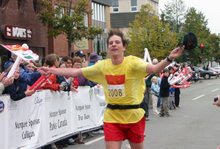
Autistic marathon runner races past expectations
http://seattlepi.nwsource.com/local/311706_bostonrun16.html
Doctors didn't think Andrew Bryant would be able to read. His mom was told she probably shouldn't leave him alone, and that he might need help showering. When he was diagnosed with autism two decades ago, doctors didn't have high expectations.
Today, the mom who heard that painful diagnosis expects to watch her son complete the Boston Marathon.
As for Bryant, the 25-year-old expects to better the 3:08:20 time that qualified him to get there.
"I surprise people," said Bryant, who can read his high school diploma.
For years, Bryant's mom never envisioned her only son crossing a street, let alone a finish line.
She never left him, too afraid of him being alone. So the morning she and her husband registered for a 5-kilometer fun run, they dressed in jeans, expecting to walk the course with Bryant, who was then 13.
"Well, the gun went off and he took off like a bullet," his mom, Colleen Engle, said.
She sprinted after her son, but couldn't catch him. She yelled his name, hoping he'd come back. When he didn't, Engle was terrified.
She found him at the end, eating a PowerBar and exceeding everyone's expectations.
He slipped away again at age 17 -- this time from his stepfather in the Las Vegas half-marathon. When Bryant was finally found, his stepfather went to check his time, but couldn't find it among the hundreds listed.
He explained to Bryant -- a special education student who can have difficulty focusing -- that his time would only be recorded if he passed through the finishing chutes.
Only on second inspection of the results did Bryant's stepfather realize he had -- in fourth place for his age division.
A small box in his North Seattle home holds Bryant's medals -- some from high school and half-marathons. He's never lost 5,000- or 10,000-meter races in the Special Olympics, which has more than 7,000 Washington state competitors with intellectual disabilities.
Autism is a disorder affecting as many as 1 out of every 150 children, with a wide range of symptoms. Some adults become well-regarded professionals, while others have a vocabulary of a few dozen words.
"When you're autistic, it's your socialization skills that are a big handicap for you," said Engle, whose son is high-functioning.
Last year, she enrolled Bryant with a Seattle running group so he'd have partners in case of an emergency. Those runners have become extremely protective and fond of him, as are his co-workers at QFC.
"He doesn't surprise me," said Chuck Bartlett, a Boston Marathon alum and Bryant's coach. "If he finds someone he can run with who can lead him, I think he can definitely break three hours."
Bryant, who moved to Seattle in 2002, said his goal is to break 2:59:36 -- the time Lance Armstrong ran in the 2006 New York City Marathon. After finishing, the six-time Tour de France champion told the media the marathon "was without a doubt the hardest physical thing I have ever done."
"The winner of the Boston Marathon or any big marathon is in the 2-hour, 15-minute range," said John Borgognoni, sports and program director for Special Olympics Washington, under which Bryant has competed. "Special Olympic athletes are closing the gap quickly, and Andy is living proof of that."
Bryant has difficult moments, especially near the end of practice runs that have been up to 24 miles. But marathons aren't as hard for him as they are for others, Bryant said.
"That's my ability," he said. "And running fast, I get to be strong."
He was both in 1999, finishing his first marathon in 4:33:33. He dropped more than an hour when he ran the 2005 Portland Marathon, and his 2006 Portland time was nearly two minutes faster than Boston's qualifying time, putting him among the world's most elite runners.
More than 1,000 disabled people have competed in the wheelchair division of the Boston Marathon, with the visually and mobility-impaired division adding to the number of disabled athletes.
Engle is sure many of those families received a diagnosis similar to what Bryant got two decades ago. She remembers the tears that came after hearing doctors say her son would never be able to read, wouldn't hold a job, couldn't function socially and wouldn't have the intellectual ability to cross a street alone.
Today, she might cry for joy when Bryant crosses the Boston Marathon finish line.
Audio Slide Show:http://seattlepi.nwsource.com/photos/boston/





















No comments:
Post a Comment